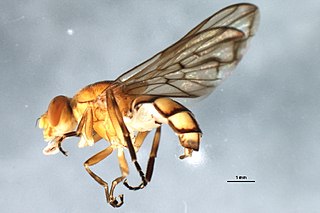
'Brachyopa notata , the Black-banded Sapeater , is a rare species of syrphid fly. It has been observed in Northeastern North America. Hoverflies get their names from the ability to remain nearly motionless while in flight. The adults are also known as flower flies for they are commonly found around and on flowers from which they get both energy-giving nectar and protein rich pollen. Larvae for this genus are of the rat-tailed type. B.notata larvae have not been described.

Chalcosyrphus (Xylotomima) curvaria the Yellow-haltered Leafwalker, is a common species of syrphid fly found throughout Northern North America. Hoverflies can remain nearly motionless in flight. The adults are also known as flower flies for they are commonly found on flowers from which they get both energy-giving nectar and protein rich pollen.

Chalcosyrphus (Xylotomima) inarmatus, the Yellow-haired Leafwalker, is an uncommon species of syrphid fly found across northern North America. Hoverflies are able to remain nearly motionless in flight. The adults are also known as flower flies for they are commonly found around and on flowers, from which they get both energy-giving nectar and protein-rich pollen.
Chalcosyrphus (Xylotomima) anthreas, the Yellow-banded Leafwalker, is a rare species of syrphid fly found in eastern North America. Hoverflies can remain nearly motionless in flight. The adults are also known as flower flies for they are commonly found on flowers, from which they get both energy-giving nectar and protein-rich pollen.

Chalcosyrphus (Xylotomima) plesia, the Black-hipped Leafwalker, is an uncommon species of syrphid fly and a mimic of Sphex nudus. This fly is found in the northeastern United States and southeastern Canada. Hoverflies can remain nearly motionless while in flight. The adults are also known as flower flies for they are commonly found around and on flowers, from which they get both energy-giving nectar and protein-rich pollen.
Milesia scutellata is a species of hoverfly in the family Syrphidae.
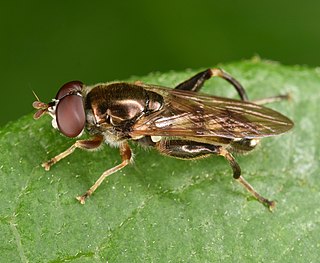
Chalcosyrphus (Xylotomima) metallicus, the Yellow-legged Leafwalker, is an uncommon species of syrphid fly observed in the southeastern United States. Hoverflies are able to remain nearly motionless while in flight. The adults are also known as flower flies for they are commonly found around and on flowers, from which they get both energy-giving nectar and protein-rich pollen.
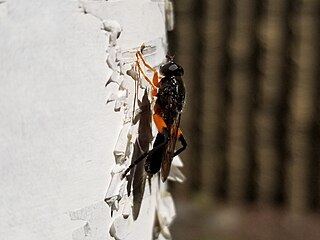
Chalcosyrphus (Xylotomima) vecors , the Orange-hipped Leafwalker, is an uncommon species of syrphid fly observed throughout North America. Hoverflies can remain nearly motionless in flight. The adults are also known as flower flies, for they are commonly found around and on flowers from which they get both energy-giving nectar and protein-rich pollen.

Chalcosyrphus (Xylotomima) metallifer , the Orange-horned Leafwalker, is a rare species of syrphid fly observed in the Eastern United States. Hoverflies can remain nearly motionless in flight. The adults are also known as flower flies for they are commonly found on flowers, from which they get both energy-giving nectar and protein-rich pollen.
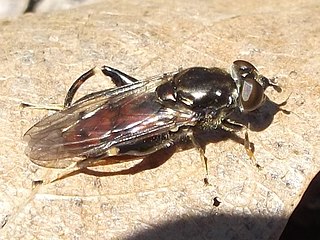
Chalcosyrphus (Xylotomima) libo, the Long-haired Leafwalker, is an uncommon species of syrphid fly observed in north-central North America. Hoverflies are able to remain nearly motionless in flight. The adults are also known as flower flies for they are commonly found around and on flowers, from which they get both energy-giving nectar and protein-rich pollen.
Spilomyia foxleei is a species of syrphid fly in the family Syrphidae.
Tropidia calcarata, the Lily-loving Thickleg Fly, is a rare species of syrphid fly observed from northeastern North America. Hoverflies can remain nearly motionless in flight. The adults are also known as flower flies for they are commonly found on flowers, from which they get both energy-giving nectar and protein-rich pollen. The larvae have been found on the rotting roots of an aquatic lily.
Chalcosyrphus (Chalcosyrphus) aristatus , the Black-dented Leafwalker, is a very rare, species of syrphid fly observed in the Northeastern United States. Hoverflies can remain nearly motionless while in flight. The adults are also known as flower flies for they are commonly found on flowers, from which they get both energy-giving nectar and protein-rich pollen.
Chalcosyrphus (Xylotomima) sacawajeae, the Hairy-winged Leafwalker, is a rare species of syrphid fly observed in the Northern United States and Western Canada. Hoverflies can remain nearly motionless while in flight. The adults are also known as flower flies for they are commonly found on flowers, from which they get both energy-giving nectar and protein-rich pollen.
Chalcosyrphus dubius is a species of syrphid fly in the family Syrphidae.
Chalcosyrphus parvus is a species of syrphid fly in the family Syrphidae.
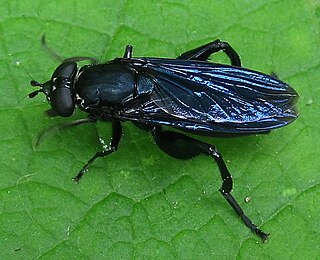
Chalcosyrphus (Xylotomima) chalybeus , the Violet Leafwalker, is a fairly common species of syrphid fly observed in the Northeastern United States. Hoverflies can remain nearly motionless in flight. The adults are also known as flower flies for they are commonly found on flowers, from which they get both energy-giving nectar and protein-rich pollen.
Xylota analis is a species of hoverfly in the family Syrphidae.
Xylota argoi is a species of hoverfly in the family Syrphidae.
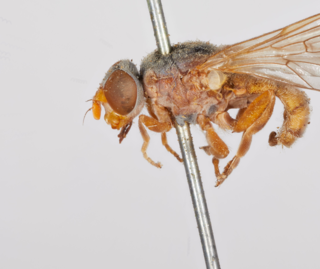
Brachyopa media ( Williston, 1882), is a rare species of syrphid fly. It has been observed in the Northeastern United States. Hoverflies get their names from the ability to remain nearly motionless while in flight. The adults are also known as flower flies for they are commonly found around and on flowers from which they get both energy-giving nectar and protein-rich pollen. Larvae for this genus are of the rat-tailed type. B.media larvae have not been described.









